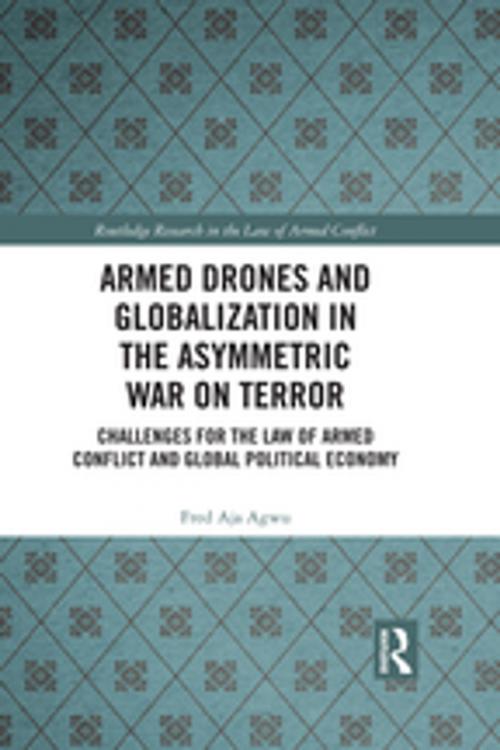Armed Drones and Globalization in the Asymmetric War on Terror
Challenges for the Law of Armed Conflict and Global Political Economy
Nonfiction, Social & Cultural Studies, Political Science, Politics, Arms Control, Reference & Language, Law, International| Author: | Fred Aja Agwu | ISBN: | 9781351342575 |
| Publisher: | Taylor and Francis | Publication: | December 6, 2017 |
| Imprint: | Routledge | Language: | English |
| Author: | Fred Aja Agwu |
| ISBN: | 9781351342575 |
| Publisher: | Taylor and Francis |
| Publication: | December 6, 2017 |
| Imprint: | Routledge |
| Language: | English |
This book is a critical exploration of the war on terror from the prism of armed drones and globalization. It is particularly focused on the United States’ use of the drones, and the systemic dysfunctions that globalization has caused to international political economy and national security, creating backlash in which the desirability of globalization is not only increasingly questioned, but the resultant dissension about its desirability appears increasingly militating against the international consensus needed to fight the war on terror.
To underline the controversial nature of the "war on terror" and the pragmatic weapon (armed drones) fashioned for its prosecution, some of the elements of this controversy have been interrogated in this book. They include, amongst others, the doubt over whether the war should have been declared in the first place because terrorist attacks hardly meet the United Nations’ casus belli – an armed attack. There are critics, as highlighted in this book, who believe that the "war on terror" is not an armed conflict properly so called, and, thus, remains only a "law enforcement issue."
The United States and all the states taking part in the war on terror are obligated to observe International Humanitarian Law (IHL). It is within this context of IHL that this book appraises the drone as a weapon of engagement, discussing such issues as "personality" and "signature" strikes as well as the implications of the deployment of spies as drone strikers rather than the Defence Department, the members of the U.S armed forces. This book will be of value to researchers, academics, policymakers, professionals, and students in the fields of security studies, terrorism, the law of armed conflict, international humanitarian law, and international politics.
This book is a critical exploration of the war on terror from the prism of armed drones and globalization. It is particularly focused on the United States’ use of the drones, and the systemic dysfunctions that globalization has caused to international political economy and national security, creating backlash in which the desirability of globalization is not only increasingly questioned, but the resultant dissension about its desirability appears increasingly militating against the international consensus needed to fight the war on terror.
To underline the controversial nature of the "war on terror" and the pragmatic weapon (armed drones) fashioned for its prosecution, some of the elements of this controversy have been interrogated in this book. They include, amongst others, the doubt over whether the war should have been declared in the first place because terrorist attacks hardly meet the United Nations’ casus belli – an armed attack. There are critics, as highlighted in this book, who believe that the "war on terror" is not an armed conflict properly so called, and, thus, remains only a "law enforcement issue."
The United States and all the states taking part in the war on terror are obligated to observe International Humanitarian Law (IHL). It is within this context of IHL that this book appraises the drone as a weapon of engagement, discussing such issues as "personality" and "signature" strikes as well as the implications of the deployment of spies as drone strikers rather than the Defence Department, the members of the U.S armed forces. This book will be of value to researchers, academics, policymakers, professionals, and students in the fields of security studies, terrorism, the law of armed conflict, international humanitarian law, and international politics.















